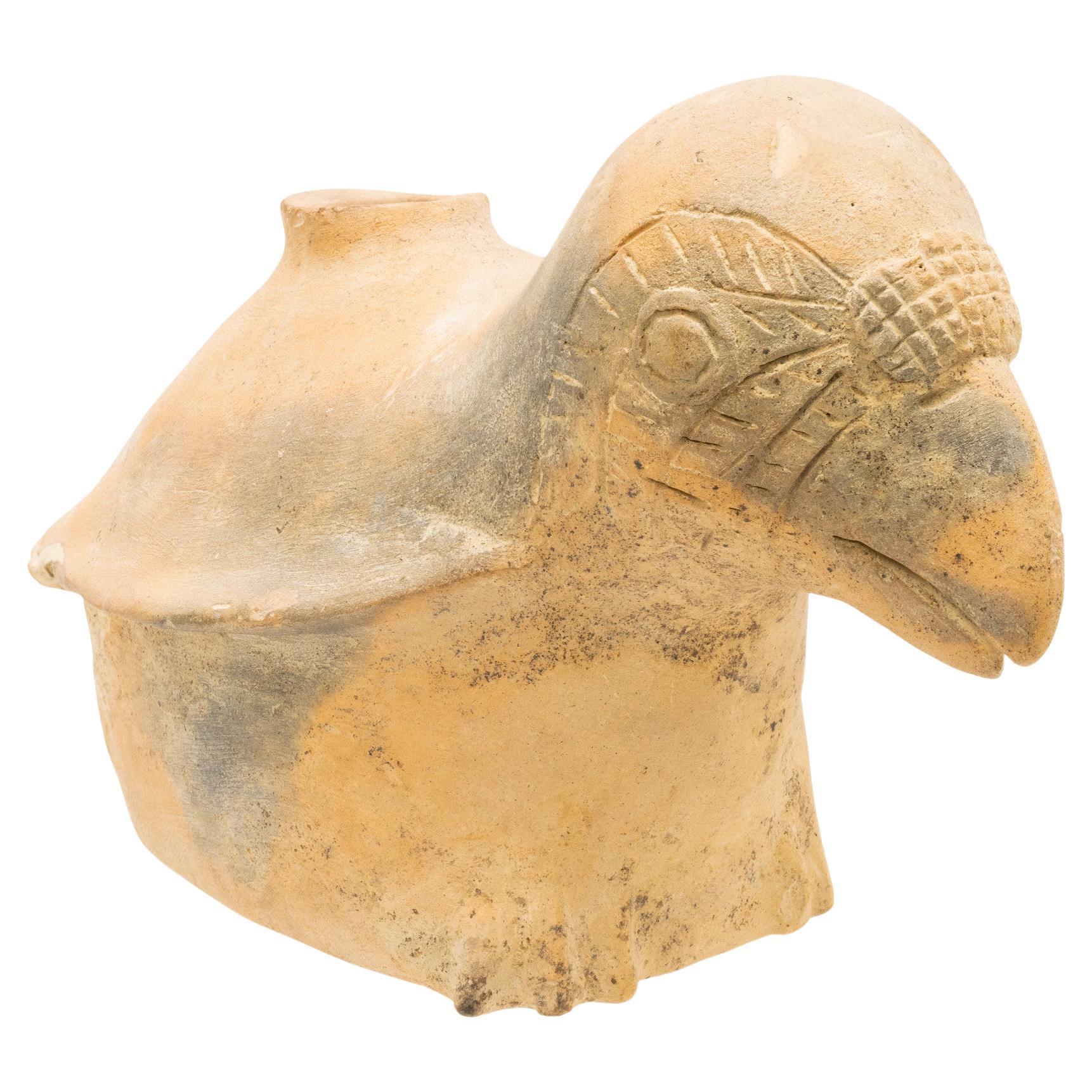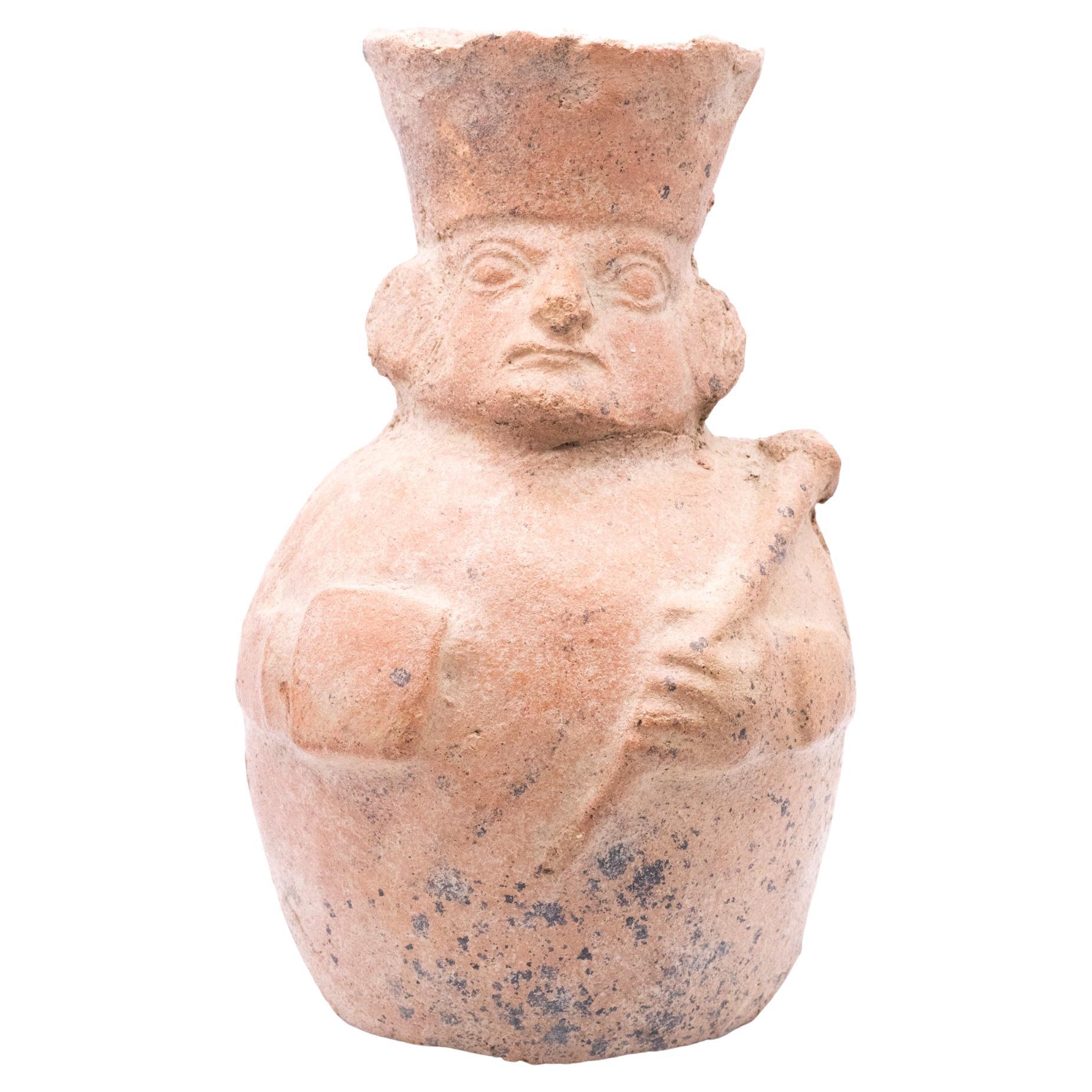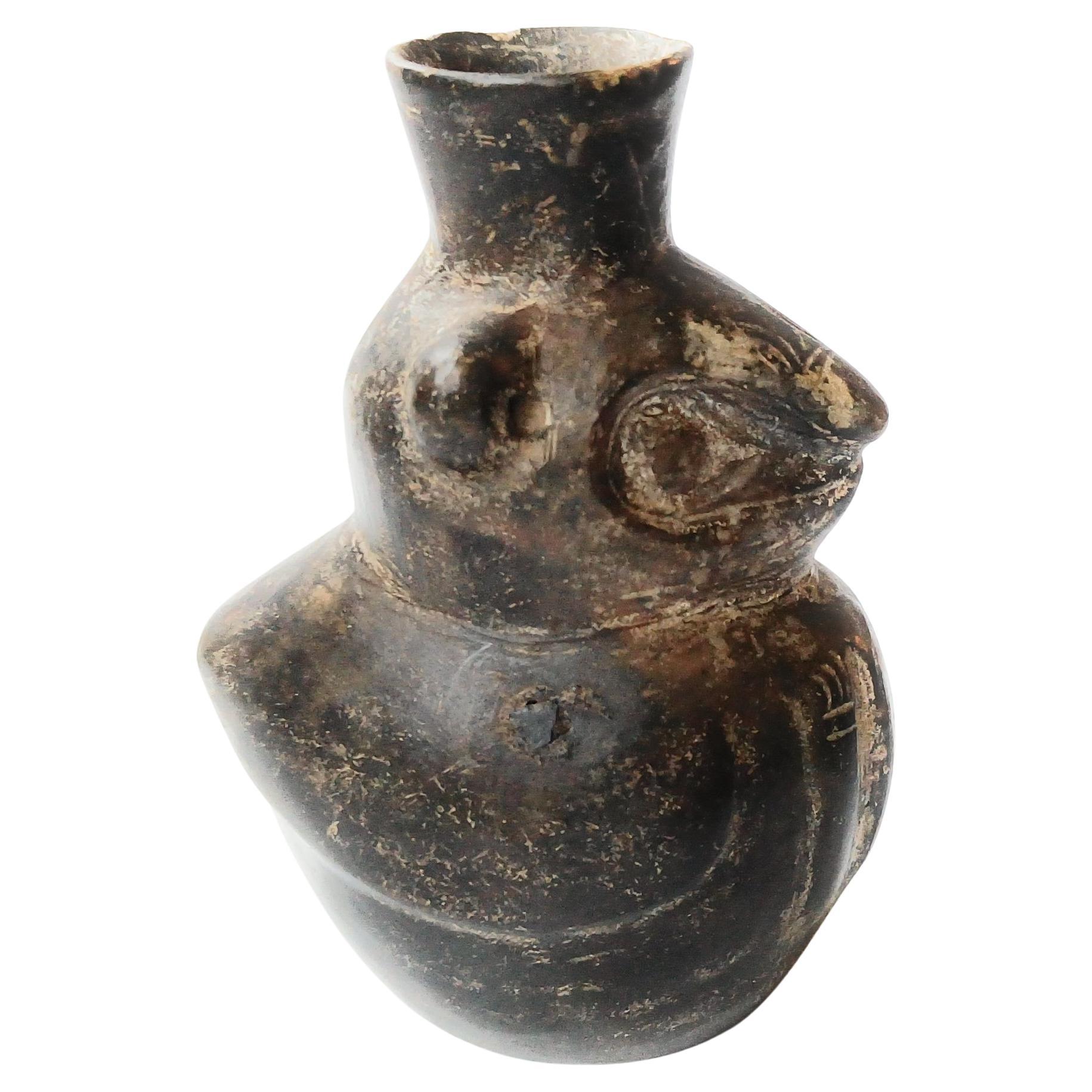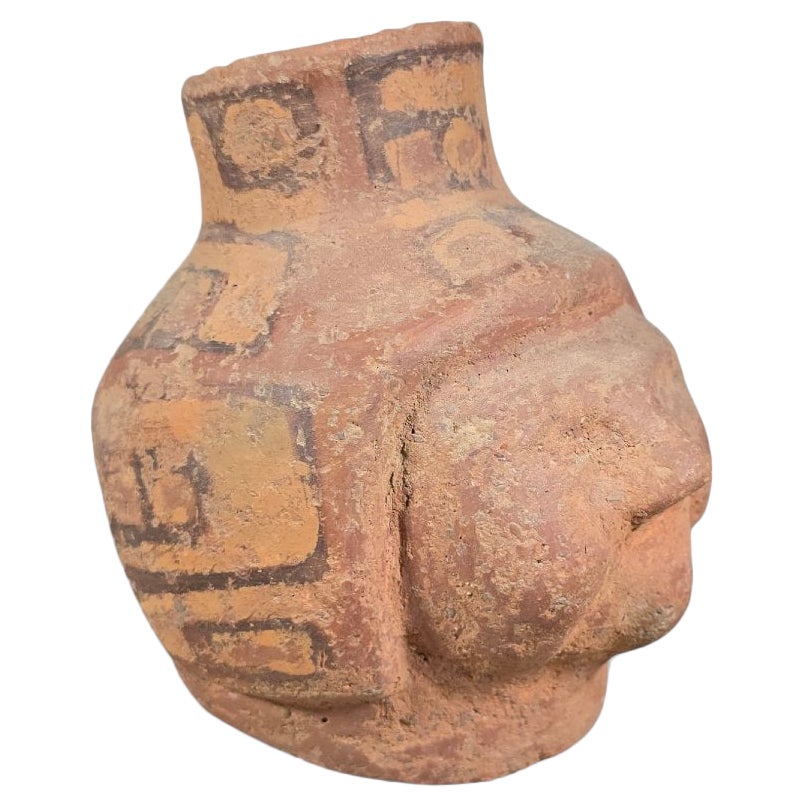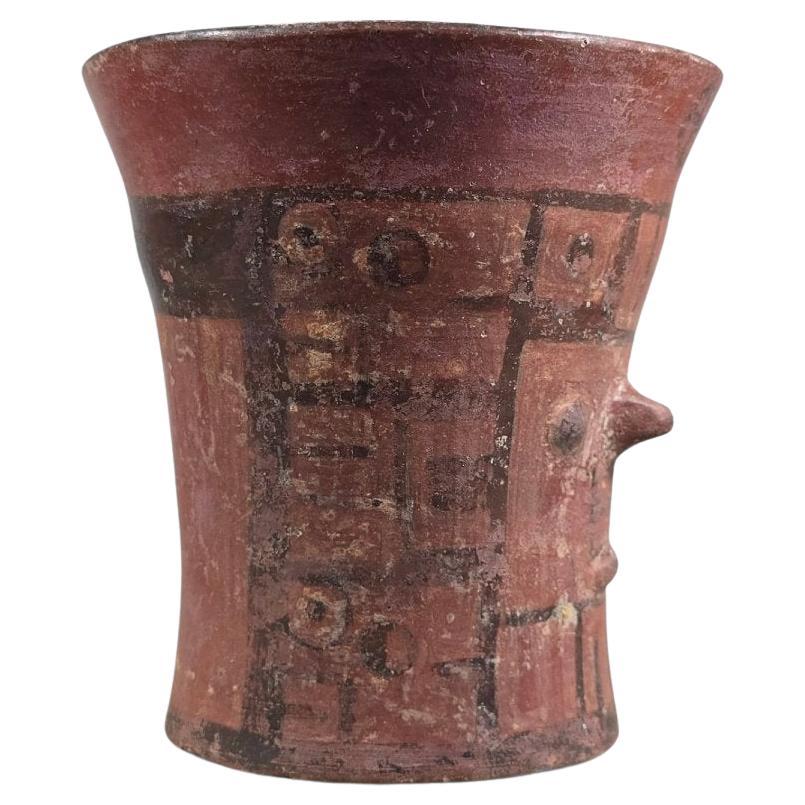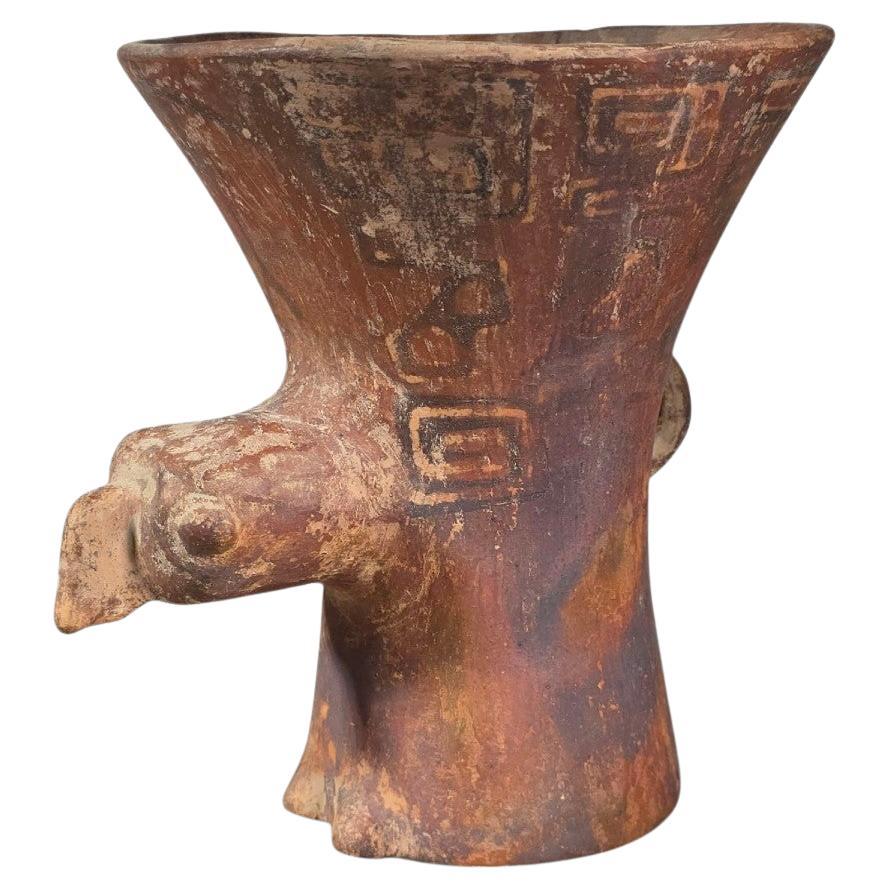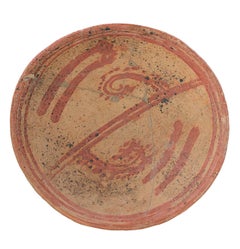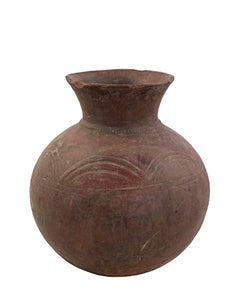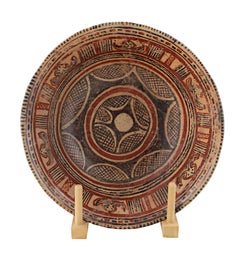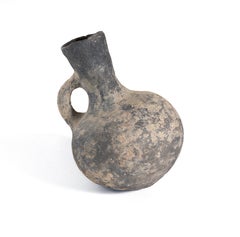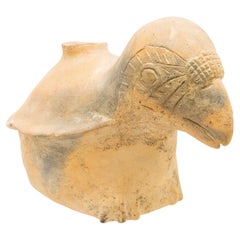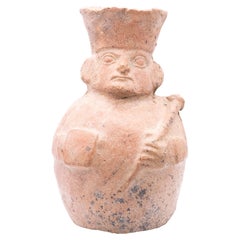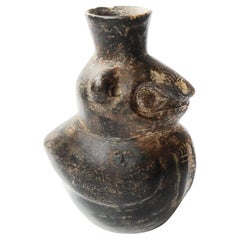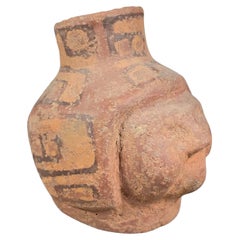Items Similar to "Moche Owl Pot, " Animalic Ceramic Vessel created in Pre-Columbian Peru
Want more images or videos?
Request additional images or videos from the seller
1 of 9
Unknown"Moche Owl Pot, " Animalic Ceramic Vessel created in Pre-Columbian PeruUnknown
Unknown
$8,750
£6,642.85
€7,598
CA$12,225.02
A$13,596.89
CHF 7,099.87
MX$165,459.68
NOK 90,676.22
SEK 85,038.29
DKK 56,706.82
Shipping
Retrieving quote...The 1stDibs Promise:
Authenticity Guarantee,
Money-Back Guarantee,
24-Hour Cancellation
About the Item
This piece is a pot made by an unknown artist in Pre-Columbian Peru. It takes the shape of an owl and has a circular handle with the opening on its back. This pot is a light beige and red ocher color.
8" x 6" x 4 3/4"
Essay from Helene Bernier: "Moche society flourished on the north Peruvian coastal desert between the first and the eighth centuries A.D., in valleys irrigated by rivers flowing westward from the Andes to the Pacific Ocean. The Moche were innovators on many political, ideological, and artistic levels. They developed a powerful elite and specialized craft production, and instituted labor tribute payments. They elaborated new technologies in metallurgy, pottery, and textile production, and finally, they created an elaborate ideological system and a complex religious iconography.
Moche skilled ceramists produced a great variety of exquisitely decorated vessels. The decoration is sometimes painted on the smooth surface of vessels; other times it is tridimensional, forming the vessel shape itself. Occasionally, the message takes both a painted and sculpted form, one completing the other . Nearly all decorated vessels are slip-painted and bichrome, with red decoration on a white/cream background. White on red and black postfire paint are also present to a lesser extent. While painted motifs are generally simple on three-dimensional vessels, two-dimensional decoration sometimes takes the shape of finely painted, highly complex narrative scenes.
Moche decorated vessels were mold-made and, despite their diversity, reveal standardized shapes and decoration. Nine basic shapes are reported in the literature. Stirrup-spout bottles and flaring bowls are the privileged supports on which artists expressed figurative, complex painted scenes. Other shapes are neck and neckless jars, dippers, bowls, neck bowls, cups, and crucibles.
Moche ceramic art represents an infinite variety of subjects. Common zoomorphic figures include camelids, deer, felines, foxes, rodents, monkeys, bats, sea lions, as well as a wide array of birds, fish, shells, arachnids, and reptiles. These animals are represented realistically, hybridized, or anthropomorphized. Corn, squash, tubers, and beans are common among a great diversity of plants. Among human and anthropomorphic figures, rulers, warriors, prisoners, priests, healers, and fanged deities are recognizable, as well as deformed and skeletal individuals. Historical individuals are also represented in realistic, three-dimensional portrait vessels . While animals are often anthropomorphized or hybridized, humans often have supernatural attributes.
All these figures are either represented alone or interacting in a variety of actions in diverse narrative scenes. Although the possibilities of creating different scenes from all existing Moche figures are almost limitless, major trends can be recognized in narrative art and representations are limited to a small number of recurring and interrelated themes. For example, deer and seal hunts, sacrifice ceremonies, warriors in battle or moving in processions, and messengers running in line are common themes in Moche ceramic art.
Scholars do not agree about the various functions of Moche decorated ceramics. Until recently, these works of art were thought to be essentially funerary offerings, as they were documented in a great number of burials. Indeed, fineware is the offering par excellence in burials of any social status as a marker of Moche social identity. Decorated vessels were imbued with a strong funerary dimension. However, many vessels uncovered in Moche burials show traces of abrasion, chipping, or repairs.
Recent excavations in residential areas, notably in the Moche and Santa Valleys in projects carried out by Universidad Nacional de Trujillo and Université de Montréal, revealed that finely decorated pottery is not only present but abundant in Moche domestic compounds. Many decorated vessels were not produced exclusively for a funerary purpose. Whereas many of them were ultimately placed in burials or made especially for the dead, most were produced to be used by the living in everyday life. The access to decorated vessels by the living was not unrestricted; some categories of vessels, as well as depictions of some religious themes, were exclusively destined for burial with the dead or for use in elite ritual performances. However, a great variety of vessels, many of them identical to those found in graves, were destined for domestic use.
Vessels decorated with religious themes were not merely indicators of social status at the site of Moche. They were strategically used at a household level, as tools to further political ambitions and communicate membership within groups. As evidenced by their iconographic content and the location in which they were abandoned, decorated vessels were an integral part of household-level rituals, meetings, and other status-building activities like feasts, where they were displayed, used, accidentally broken, and in some cases given away along with food and corn beer."
- Creation Year:Unknown
- Dimensions:Height: 8 in (20.32 cm)Width: 6 in (15.24 cm)Depth: 4.75 in (12.07 cm)
- Medium:
- Period:
- Condition:item in excellent condition for its age, small holes on face of owl, some fading, chipping, and discoloration of slip coloring.
- Gallery Location:Milwaukee, WI
- Reference Number:Seller: 2117d1stDibs: LU60532342931
About the Seller
4.9
Platinum Seller
Premium sellers with a 4.7+ rating and 24-hour response times
Established in 1966
1stDibs seller since 2017
435 sales on 1stDibs
Typical response time: 2 hours
- ShippingRetrieving quote...Shipping from: Milwaukee, WI
- Return Policy
Authenticity Guarantee
In the unlikely event there’s an issue with an item’s authenticity, contact us within 1 year for a full refund. DetailsMoney-Back Guarantee
If your item is not as described, is damaged in transit, or does not arrive, contact us within 7 days for a full refund. Details24-Hour Cancellation
You have a 24-hour grace period in which to reconsider your purchase, with no questions asked.Vetted Professional Sellers
Our world-class sellers must adhere to strict standards for service and quality, maintaining the integrity of our listings.Price-Match Guarantee
If you find that a seller listed the same item for a lower price elsewhere, we’ll match it.Trusted Global Delivery
Our best-in-class carrier network provides specialized shipping options worldwide, including custom delivery.More From This Seller
View All"Pre-Columbian Bowl (repaired), " Red & Brown Painted Ceramic
Located in Milwaukee, WI
This Pre-Columbian bowl featuers red marks on a light orange ground. It is 9" in diameter and has been previously repaired.
Category
15th Century and Earlier Tribal Sculptures
Materials
Ceramic
"Ceramic Pot - Mossi, Burkina Fasso (Farmer's Water Jug), " created in Africa
Located in Milwaukee, WI
This ceramic pot was made by an unknown Mossi artist in Burkina Fasso. It was used as a farmer's water jug. The Mossi are a people in central Burkina Faso, living mostly in the villa...
Category
1930s Folk Art Sculptures
Materials
Ceramic
"Pre-Columbian Chinesco Bowl, " Glazed Ceramic circa 300 B.C.
Located in Milwaukee, WI
This Chinesco bowl was from a pre-Columbian society from around 300 BCE. It features abstract, geometric designs in red and black. The diameter is 8".
Category
15th Century and Earlier Abstract Geometric Abstract Sculptures
Materials
Ceramic, Glaze
Jerusalem, Perfume Vessel, Iron Age
Located in Milwaukee, WI
4x3
Ceramic
Ancient clay perfume jug from the Iron Age discovered in Jerusalem.
Category
15th Century and Earlier Sculptures
Materials
Ceramic
"Casas Grandes Pottery, " a Ceramic Pot signed with Benito Morass
By Benito Morass
Located in Milwaukee, WI
"Casas Grandes Pottery" is a signed hand-built ceramic vessel with slip glaze created by Benito Morass. It features an abstract geometric design ...
Category
1990s Abstract Geometric Sculptures
Materials
Ceramic, Slip, Glaze
"Chancay" (Pre-Columbian) Mummy Mask wood face peruvian folk red human folk art
Located in Milwaukee, WI
The Peruvian Chancay (pre-Columbian) Mummy Bundle mask, from around 1600 is made of painted wood, textiles, and human hair. According to the Walters Art Museum:
Andean cultures are ...
Category
Early 1600s Folk Art More Art
Materials
Textile, Wood
You May Also Like
Pre- Columbian Jamacoaque Pottery Bird
Located in Coeur d'Alene, ID
Jamacoaque pottery bird vessel- dating between 300 BC and 300 CE. 6 ½” x 3 ½” x 4 ½”. Ex. Hank Johnson Collection. Hank Johnson was a geologist, and passionate collector of historica...
Category
Antique 15th Century and Earlier Mexican Ceramics
Materials
Clay
Peru Pre Inca 100-700 Ad Moche Pre Columbian Personified Vessel in Earthenware
Located in Miami, FL
Rare pre Hispanic Moche culture, pre-Inca earthenware vessel.
A beautiful interesting piece, created in the southern Peru region around the 100-700 AD by the Moche culture. This rare early period...
Category
Antique 15th Century and Earlier Peruvian Pre-Columbian Antiquities
Materials
Earthenware, Pottery
$1,880 Sale Price
20% Off
Pre-Columbian Chimu Avian vessel ancient south America Circa 10 -15th century AD
Located in London, GB
A very cute small grey ware vessel of a bird transforming into a squirrel type creature with hands held in front, highlighting the principle of duality often depicted in the pre Columbian art
Pre-Columbian Chimu vessel...
Category
Antique 15th Century and Earlier Peruvian Antiquities
Materials
Pottery
Pre-Columbian ceramics cup– Tiahuanaco Culture
Located in Madrid, ES
"Pre-Columbian Ceramics – Tiahuanaco Culture"
Material: ceramics
Origin: Southern Sierra of Peru, Lake Titicaca Plateau
Period: Boom Age (1 AD – 800 AD)
Dimensions: 24x20x17cm
Condit...
Category
Antique 15th Century and Earlier South American Tribal Ceramics
Materials
Ceramic
Pre-Columbian ceramics cup– Tiahuanaco Culture
Located in Madrid, ES
"Pre-Columbian Ceramics – Tiahuanaco Culture"
Material: ceramics
Origin: Southern Sierra of Peru, Lake Titicaca Plateau
Period: Boom Age (1 AD – 800 AD)
Dimensions: 12 x 11 cm diamet...
Category
Antique 15th Century and Earlier South American Tribal Ceramics
Materials
Ceramic
Pre-Columbian ceramics vessel– Tiahuanaco Culture
Located in Madrid, ES
Pre-Columbian Ceremonial Vessel with Avian Motif, 24x17x20 cm
A captivating Pre-Columbian ceramic vessel featuring a pronounced avian head protuberance, likely symbolizing a bird of...
Category
Antique 15th Century and Earlier South American Tribal Ceramics
Materials
Ceramic
$1,162 / item
More Ways To Browse
Antique Peru
White Ceramic Pots
Sculpture Of Two Lions
Peru Sculpture
White Lion Sculpture
Sea Lion
Peruvian Pre Columbian
Cream Ceramic Sculpture
Fox Ceramic
Antique Ceramic Fish
White Ceramic Shell
Antique Ceramic Bottles
Monkey And Bird
Antique Cream Pot
Antique Cream Pots
Ceramic Monkey
Lion Sculpture Ceramic
Antique Fox Hunt
